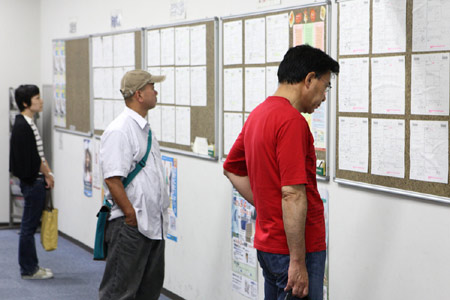World Business
Japan jobless rate unexpectedly rises to 5.1% in April
By Aki Ito (China Daily)
Updated: 2010-05-29 10:28
 |
Large Medium Small |
|
 |
|
People look at job advertisements at a job center in the Toshima Ward, in Tokyo. In April, the Japanese economy lost a net 280,000 jobs, marking the third month of declines. [Bloomberg] |
TOKYO - Japan's unemployment rate unexpectedly increased in April, household spending fell and deflation deepened, signaling domestic demand is restraining the nation's recovery from its worst postwar recession.
The jobless rate rose to 5.1 percent from 5 percent, the statistics bureau said on Friday in Tokyo. The median forecast of 23 economists surveyed by Bloomberg News was for no change. Consumer prices excluding fresh food slid 1.5 percent from a year earlier after dropping 1.2 percent in March.
The reports came a day after government figures showed an extended rebound in exports, driven by demand from Asia's emerging economies, and highlight Japan's reliance on trade to sustain growth. Finance Minister Naoto Kan said he will try to spur employment that's "crucial" to overcoming price declines.
"Japan's dependence on exports will continue," said Yuichi Kodama, chief economist at Meiji Yasuda Life Insurance Co in Tokyo. "Deflation is persisting, and that will dissuade consumers and companies from spending."
Concern that the European sovereign debt crisis will damp global demand for Japanese goods sent the Nikkei 225 Stock Average 11 percent lower this month. It rose 1.28 percent in Tokyo after shares gained in Europe and the US on China's pledge to invest in the eurozone.
Household spending dropped 0.7 percent in April from a year earlier, the bureau said. The median estimate of economists surveyed was for a 2.5 percent increase. Retail sales rose 4.9 percent from a year earlier, led by gas stations and auto showrooms.
"Last quarter's consumer spending was still focused on durable goods," said Yoshimasa Maruyama, a senior economist at Itochu Corp in Tokyo. "It's still unclear whether consumers feel ready to spend money again."
Exports fueled Japan's 4.9 percent annualized expansion in the three months ended March, data showed last week. That report also showed that outlays on long-lasting products increased at a slower pace, adding to concerns that boosts from government incentives to buy cars and electronics are fading.
From a month earlier, the economy lost a net 280,000 jobs, marking the third month of declines. Payrolls in industries including agriculture, manufacturing, real estate and education dwindled. The labor force shrank by 220,000.
"Given the situation in Europe, there's still some uncertainty about the outlook, and that's why companies can't aggressively expand their hiring plans," Maruyama said.
Europe's woes have caused the yen to strengthen this month against all 16 major currencies tracked by Bloomberg, threatening the competitiveness of the nation's exporters. Japan's currency traded at 91.16 per dollar from 90.98 before the reports, and 112.21 against the euro from 112.31.
A separate report on Friday showed the ratio of jobs to applicants fell to 0.48, meaning there are 48 jobs for every 100 candidates. It was the first deterioration in eight months.
Takeda Pharmaceutical Co aims to reduce its workforce by about 10 percent, it said this month. Asia's largest drugmaker wants to save 50 billion yen ($550 million) over three years.
"Employment conditions have an impact on deflation because if employment improves, that will help wage growth and narrow the gap between demand and supply," Finance Minister Kan told reporters in Tokyo.
The drop in consumer prices was exacerbated by the government's introduction of a waiver on high school tuition fees to assist households. The central bank has estimated the step will lower core prices by about 0.5 percentage point.
"Excluding the school fee effect, which is temporary, downward pressure on prices will keep waning, but the pace will be very slow," said Hiroshi Watanabe, a senior economist at Daiwa Institute of Research in Tokyo. "Given this, the Bank of Japan's exit from its emergency policy mode is still remote."
Bloomberg News



